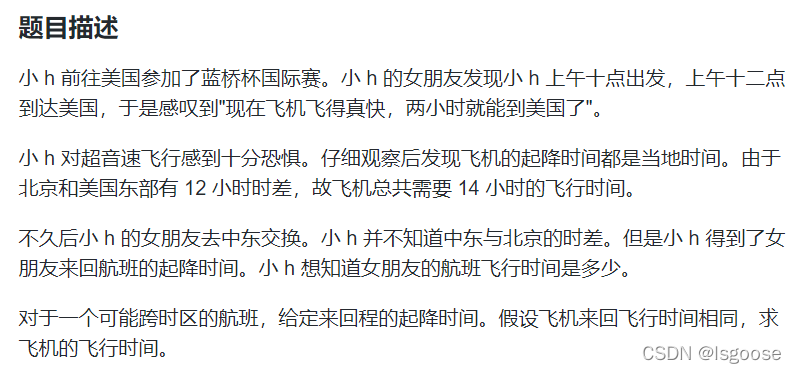
?
?
输入输出样例
示例
输入
3
17:48:19 21:57:24
11:05:18 15:14:23
17:21:07 00:31:46 (+1)
23:02:41 16:13:20 (+1)
10:19:19 20:41:24
22:19:04 16:41:09 (+1)
输出
04:09:05
12:10:39
14:22:05
运行限制
- 最大运行时间:1s
- 最大运行内存: 256M
?这题主要是两个问题:字符串处理和思路。
首先是思路,既然每组数据都是去的和回来的两个时间,我们可以忽略时差,为什么呢?因为抵消了。所以我们的时间就是两个时间的end-start相加之后除以二就是航班飞行时间了对吧。
之后就是字符串处理的问题:
比如我们读到降落时间的时候怎么去处理呢?我们可以这么做,首先和start时间一样用scanf读取三个时间参数,对后面的空格括号等等单独处理,用getchar处理,不过注意的是即使读完了第几天的数字也要继续读下去,因为下一次还得输入呐。
具体代码如下所示:
#include <bits/stdc++.h>
using namespace std;
const int day=24*60*60;
const int hour=60*60;
const int minute=60;
int start()
{
int a,b,c;
scanf("%d:%d:%d",&a,&b,&c);
int time=a*hour+b*minute+c;
return time;
}
int end()
{
int a,b,c;
scanf("%d:%d:%d",&a,&b,&c);
int time=a*hour+b*minute+c;
char ch,extra_day;
while((ch=getchar())!='\n'&&ch!='\r')
{
if(ch=='(')
{
getchar();
extra_day=getchar();
time+=(extra_day-'0')*day;
}
}
return time;
}
void display(int time)
{
int a,b,c;
a=time/hour;
time%=hour;
b=time/minute;
c=time%minute;
printf("%02d:%02d:%02d\n",a,b,c);
}
int main()
{
// 请在此输入您的代码
int t;
scanf("%d",&t);
while(t--)
{
int start1=start();
int end1=end();
int start2=start();
int end2=end();
int time=(end1-start1) + (end2-start2);
display(time/2);
}
return 0;
}